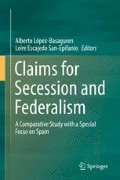Abstract
The Federal system has never provided an easy solution to resolve secessionist aspirations. However, even with the known federal paradox—on the one hand, a model to control external self-determination with its internal self-government; on the other, a state that can improve secessionist desires through antagonistic identities—, federalism is the best way to confront democratic legitimacies (contradictory plebiscites and their arithmetic rules without substantial values) with effective legality (rule of law under the original nation-state). The inevitable clash between the old juridical order (founded in the democratic “indissoluble” nation) and the radical aspiration for a new total sovereignty (vox populi, vox dei) could be counteracted through clear processes establishing checks and balances across different steps.
That is why the revision of Spanish Constitution would be the only way to provide a fair and lasting answer for different majorities between territorial communities and the whole population: to insert in the New Constitution a transactional clause of secession (also supported by a significant number of the sovereigntists)—with its qualified majorities, time delimitations, complex questions, and even external arbitrations—could be a better approach that would stabilize winners without imposing unilateral solutions.
Nevertheless, to make this constitutional amendment we need to forget the ontological foundation of the Spanish Constitution (the unity and indivisibility of its Nation as unlimited power), including any notions of a nation as an existential community with homogeneous identity and monolithic decision. Without anachronistic ideas of absolute sovereignties (vox populi, always plural wills), the mutation from a univocal definition of nation-state to more political pluralities and multilevel governances could be the starting point to rebuild a true Federal Constitution which is open to intra-state solidarity. And here, the transnational integration under European and Universal orders—with their inviolable human rights and jus cogens—might help us find our real way.
Access this chapter
Tax calculation will be finalised at checkout
Purchases are for personal use only
References
Álvarez Junco J (2016) Dioses útiles. Naciones y nacionalismos. Galaxia Gutenberg, Barcelona, 316 pp
Cassese A (2012) Realizing Utopia. Oxford University Press, Oxford 700 pp
Fioravanti M (2014) Constitucionalismo. Trotta, Madrid, 160 pp
Fossas E (2014) Interpretar la política. Revista Española de Derecho Constitucional, 101, Madrid, pp 273–300
Kalyvas A (2009) Democracy and the politics of the extraordinary. Cambridge University Press, New York 340 pp
López-Basaguren A (2013) La secesión de territorios en la Constitución Española. Revista de Derecho de la Unión Europea, 25, Madrid, pp 87–106
Sanz Moreno JA (2012) Democracia finalista y defensa de la Constitución española. Revista de Derecho, N° 10, UNED, Madrid, pp 611–631
Sanz Moreno JA (2013a) Democratic citizenship and Spanish multinational (Dis)order: procedural democracy Versus secession clause. In: López-Basaguren A, Escajedo L (eds) The ways of federalism, vol 2. Springer, New York, pp 731–742
Sanz Moreno JA (2013b) El parlamentarismo en su encrucijada: Schmitt versus Kelsen, o la reivindicación del valor de la democracia. Revista de Estudios Políticos, 162, Madrid, pp 113–148
Sanz Moreno JA (2014) Democracia intangible, educación y derecho(s). In: Padilla G (ed) Contenidos Especializados en la Enseñanza Superior. ACCI, Madrid, pp 431–446
Weber M (1968) Economy and society. Bedminster Press, New York 1643 pp
Author information
Authors and Affiliations
Corresponding author
Editor information
Editors and Affiliations
Rights and permissions
Copyright information
© 2019 Springer Nature Switzerland AG
About this chapter
Cite this chapter
Sanz Moreno, J.A. (2019). The Myth of Ontological Foundations and the Secession Clause as Federal Answers to National Claims of External Self-Determination. In: López-Basaguren, A., Escajedo San-Epifanio, L. (eds) Claims for Secession and Federalism. Springer, Cham. https://doi.org/10.1007/978-3-319-59707-2_20
Download citation
DOI: https://doi.org/10.1007/978-3-319-59707-2_20
Published:
Publisher Name: Springer, Cham
Print ISBN: 978-3-319-59706-5
Online ISBN: 978-3-319-59707-2
eBook Packages: Law and CriminologyLaw and Criminology (R0)

